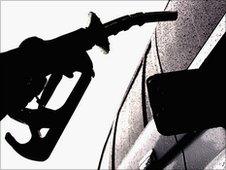EU biofuels 'need to be certified for sustainability'
- Published

Imports account for more than a quarter of the EU's biofuel use
EU nations are being encouraged to set up certification schemes to ensure biofuels help cut emissions and do not threaten biodiversity.
The plans, outlined by the European Commission, would apply to all types of biofuels, including imported fuel.
The commission said the schemes would deliver substantial CO2 reductions and help protect forests and wetlands.
Environmental groups said the voluntary measures were too weak to halt a "dramatic increase in deforestation".
Announcing the measures, EU Energy Commissioner Gunther Oettinger said: "In the years to come, biofuels are the main alternative to petrol and diesel used in transport, which produces more than 20% of the greenhouse gas emissions in the European Union.
"We have to ensure that the biofuels used are also sustainable," he added.
Mr Oettinger said the scheme was the "most stringent in the world" and would ensure that biofuels used in the EU would "meet the highest environmental standards".
He suggested that, as the plans also covered imports, it would help protect natural habitats in other parts of the world that were at risk from the expanding global demand for biofuels.
In recent years, biofuels - once seen as a green saviour of transport - have fallen out of favour with environmental groups and policy makers.
For example, studies have shown that some biofuels are more polluting that the fossil fuels they replace.
Another major concern is that the growing demand for fossils fuels has led to arable land being planted with more profitable biofuel crops, rather than food crops.
Studies have also raised fears that biofuel plantations could be using plants that are capable of becoming established in the surrounding habitat, harming fragile ecosystems.
The commission hopes that the new criteria will help allay these concerns.
Growing concerns
The package announced by the commissioner in Brussels on Thursday contained three measures:
- governments, industry and NGOs are encouraged to establish "voluntary schemes". In order for the schemes to be recognised by the European Commision, they must be independently audited.
- the fuels must not be made from raw materials from tropical forests or recently deforested areas, drained peatlands, wetlands. For example, the commission said the conversion of a forest to a palm oil plantation would not meet its sustainability criteria.
- biofuels have to deliver savings of at least 35% compared with fossil fuels, rising to 50% in 2017 and to 60% by 2018.
Under the EU Renewable Energy Directive, which was established in 2009, the 27-nation bloc was set the target of ensuring that 20% of its energy consumption came from renewable sources by 2020.
The directive also required nations to ensure that renewables accounted for 10% of the energy used in the transport sector.
In a statement, the commission said that only biofuels that met the new sustainability criteria would count towards the 2020 target.
However, environmental groups said the measures did not go far enough to ensure the alternative fuels did not harm the environment.
"Dirty biofuels exacerbate climate change and lead to destruction of rainforests," said Sebastien Risso, Greenpeace EU's forest policy officer.
"Under the current scheme, Europeans wanting to cut their carbon footprint could actually make the problem worse by using biofuels," he added.
"The worst biofuels are actually more polluting than petrol and there is a very real risk that Europe's cars will run on forest destruction and animal extinction."
The environmental campaign group said the commission's criteria failed to address the impact of indirect land-use change, for example, when agricultural land is set aside to grow biofuels, there is pressure to cut down forests in order to grow food.
However, researchers developing new ways to produce biofuels say that advances in technology mean that the non-food crops grown on marginal or non-arable land can be used to meet the growing demand.
James Nicholson MEP, agriculture spokesman for the European Conservatives and Reformists group, broadly welcomed the commission's plans.
"The current crop of biofuels have their limitations and the commission is right to finally develop criteria to stop the damage that they can do, if produced unsustainably," he said.
However, he added, future generations of biofuels offered "almost limitless possibilities".
"They have the potential to increase our energy supply without harming the environment or taking land away from food production.
"This is the way forward and the commission should be putting far more emphasis on the research, development and promotion of these technologies."
Figures from the European Commission shows that in 2007, approximately 26% of biodiesel and 31% of bioethanol used in the EU was imported. Most of the imports, it adds, came from Brazil and the US.